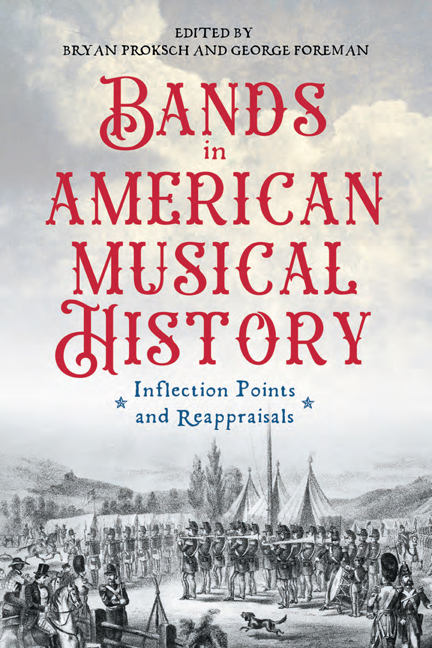Introduction
Published online by Cambridge University Press: 11 May 2024
Summary
Bands occupy a problematic space within the field of musicology. One might expect, given the centrality of bands as a dominant form of popular music in America from the 1830s to the Great Depression, that bands would be well represented in prominent journals and conferences alongside jazz, rock, country, and hip hop. These popular genres have received seemingly constant attention over the years, ranging from books and dedicated periodicals to entire general education courses at most colleges and universities. On the other hand, bands—central to American popular music for at least as long as all the other genres combined—have been consistently overlooked. Various reasons for this disparity exist; by considering several of them in this introduction, we hope to begin the process of remedying the situation.
The dedication of the collection to Frank Cipolla offers an excellent opportunity to reflect on the field of band research as it exists at present and how it will evolve in the future. Cipolla wore many hats over the course of his long and productive career—orchestral trumpet player, band director, conductor, scholar, bandsman, and educator. Each of these roles gave him a unique perspective on the many “inflection points” in band history. In 1961 he became director of bands at SUNY-Buffalo, where he remained for three decades. During the early years of his appointment, when the university played Division I football, marching band and pep band—the bands most popular and visible to the general public—occupied much of his time. The university marching band disappeared in 1971 when the school discontinued its football team. Left with more time to explore the artistic side of bands, Cipolla concentrated his efforts on his wind ensemble and concert band. Along the way he published essays and was an advocate for greater knowledge of band history among both educators and scholars. He wrote on the major figures of band history, edited essay collections containing foundational research, maintained a bibliography of scholarly writings, and worked to integrate historic band music into the repertoires of modern high-school and college bands.
- Type
- Chapter
- Information
- Bands in American Musical HistoryInflection Points and Reappraisals, pp. 1 - 6Publisher: Boydell & BrewerPrint publication year: 2024



